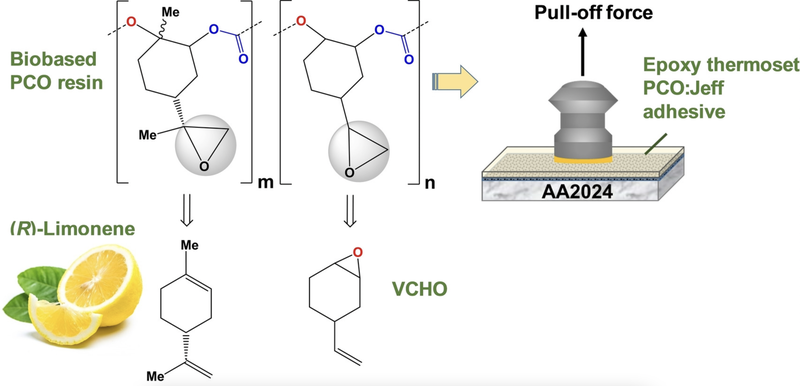Biobased epoxy thermosets
Mar 11, 2022
Our postdoc Vitor B. Moreira and coworkers recently published their work, in collaboration with ICIQ (Tarragona), about a new biobased adhesive material.
The publications in question are A Biosourced Epoxy Resin for Adhesive Thermoset Applications and Novel Biobased Epoxy Thermosets and Coatings from Poly(limonene carbonate) Oxide and Synthetic Hardeners.
The abstract retrieved from the former is: Biobased epoxy-derived raw materials will be essential for future coating and adhesive designs in industry. Here, a facile approach is reported towards the incorporation of limonene into an epoxy-functionalized polycarbonate and its crosslinking with a polyamine curing agent to obtain a thermoset material. For the first time, a solvent-borne adhesive with excellent film-forming, mechanical and adhesion strength properties is described.
While the abstract of the latter is: In the area of coating development, it is extremely difficult to find a substitute for bisphenol A diglycidyl ether (DGEBA), the classical petroleum-based raw material used for the formulation of epoxy thermosets. This epoxy resin offers fast curing reaction with several hardeners and the best thermal and chemical resistance properties for applications in coatings and adhesive technologies. In this work, a new biobased epoxy, derived from poly(limonene carbonate) oxide (PLCO), was combined with polyetheramine and polyamineamide curing agents, offering a spectrum of thermal and mechanical properties, superior to DGEBA-based thermosets. The best formulation was found to be a combination of PLCO and a commercial curing agent (Jeffamine) in a stoichiometric 1:1 ratio. Although PLCO is a solid due to its high molecular weight, it was possible to create a two-component partially biobased epoxy paint without the need of volatile organic compounds (i.e., solvent-free formulation), intended for use in coating technology to partially replace DGEBA-based thermosets.

Share: